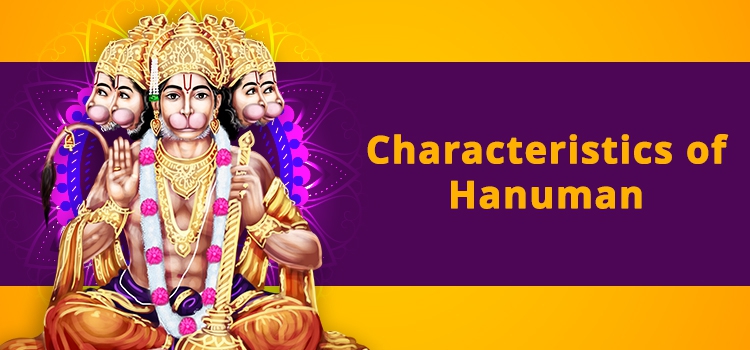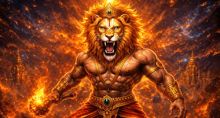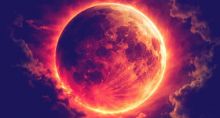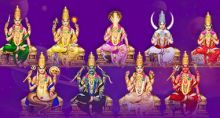Characteristics of Hanuman
Hanuman is the Monkey God who Hindus worship. He was a great devotee of Rama and played a major role in the Ramayana. It is often said that those who wish to please Rama should worship Hanuman. But Vedic literature does not mention Hanuman. Some scholars feel that “Hanumant” is the Sanskrit form of a Tamil word. When translating Dravidian words into Sanskrit, often the alphabet “h” is prefixed to the word. Thus, Idumbika becomes Hidimba, and Anmandi (an means ‘monkey’ and mandi means ‘man’), when translated to Sanskrit, becomes Hanuman. Hanuman is also called “Anumandan” in South India.

The story of Hanuman’s birth appears in the Valmiki Ramayan (Kishkindhakand, sarga 66). He was born to the apsara, Anjani, who was the wife of Kesari, the monkey king, after she ate some divine kheer that Vayu (Wind god) deposited on her palm. It was the same kheer that King Dasaratha’s wives also consumed after he performed a Putrakameshti Yagna for a son.
As a small child, he mistook the rising sun for a ripe fruit and leaped into the sky to take it. That day was a solar eclipse when Rahu (the dragon’s head) was to swallow the sun. Thinking that Hanuman was like Rahu, Indra hurled his thunderbolt at him. It hit Hanuman’s chin (hanuvati) which developed a cleft. So he got the name, Hanuman.
Hanuman is also like Rama’s brother because of the kheer his mother had. Rama and his brothers were born after the queens of King Dasaratha had the same kheer that came from the sacrificial fire. It was the full moon (Purnima) day of the Hindu month of Chaitra. This is Hanuman’s birthday or Hanuman Jayanti.
Hanuman is also called Maruti. The word comes from Marut. Maruts are the sons of Rudra, a form of Shiva. Hanuman is supposedly an incarnation of Shiva. There are 11 rudras, and Hanuman is also a rudra. He is one of the 11 rudras. Bhim is one of the names of these rudras. He is also called “Bhimrupi Maharudra”. The belief is that Hanuman’s Panchamukhi (5-faced) idols were derived from the 5-faced idol of Rudrashiva.
Hanuman is an incarnation of Rudra. The relationship between Hanuman and Rudra probably originated in the time of the Puranas. The Ramayana refers to Vayu as Hanuman’s father. Later, he became an incarnation of Rudra because of his innate traits. The relationship between Rudra and Hanuman is illustrated in works like the Skanda Purana, Brahmavaivarta Purana, Narada Purana, Shiva Purana, Bhavishya Purana, Mahabharata, etc.’
Characteristics of Hanuman
Hanuman has a towering personality. He was instrumental in the defeat of Ravana and the recovery of Sita. His devotion to Rama is the stuff of legend. He had great strength and many supernatural powers, but he was also very humble.
He was omnipotent
Among all the gods, only Hanuman is not troubled by distressing energies. Despite the hordes of demons in Lanka, none could harm him. He leaped into the sky to eat the sun soon after he was born. From this, it is obvious that the spiritual son of Vayu had no fear, even of the sun, which represents the fire element. Vayu is the most subtle of all the 5 elements, and hence it is more powerful than the fire element.
He is also considered the master of spirits. So, when spirits possess someone, people take the person to a Hanuman temple, and Hanuman Stotras are recited to exorcise the spirits.
He had the Ashtasiddhis
Hanuman had supernatural powers. His powers are called the Ashtasiddhis. They are 8 in number, and they are Anima, Mahima, Garima, Laghima, Prapti, Prakamya, Isitva, and Vasitva. Anima siddhi enables one to shrink one’s body. Mahima siddhi enables one to assume gigantic forms. Garima siddhi allows one to alter the weight of their body. Laghima siddhi allows one to decrease the body weight. The person can become as light as a feather and fly. Prapti siddhi enables one to get what one desires instantly, out of thin air. Prakamya siddhi bestows many abilities. One can increase their longevity, teleport, or live underwater. It enables one to adapt to any circumstance. Isitva gives the ability to influence nature. The earth will move according to one’s wish, the sky will rain when one demands it, and the wind will move as per one’s desire. Vasitva siddhi allows one to control other people’s minds and also the minds of animals. The person will be able to tame wild animals and control mentally disturbed individuals.
A great bhakt (devotee)
Hanuman exemplifies devotion as a servant (dasyabhakti). He was even willing to sacrifice his life for Rama. He considered it more important than the attainment of Moksha. Hanuman was both a loyal servitor and soldier.
He was a warrior, but was also spiritual
In the thick of battle, too, Hanuman would take some time to sit aside and meditate for a while. But he was always alert, and his tail would be resting on his mace.
He was intelligent
He was very learned and intelligent. He was an expert in Vyakarana or grammar rules, wrote poetry, and was, among other things, an instructor and director, envoy, commentator, and compiler. This finds mention in the Uttarramacharita, 36.44-46. He is described as the 11th proponent of grammar.
He was a psychologist and astute politician
Sugriva, the king of monkeys, and Rama often took Hanuman’s advice. When several lieutenants expressed their misgivings about giving refuge to Vibhishana (Ravana’s brother), who deserted Ravana during the war, it was Hanuman who suggested that Rama should trust him. His intelligence and psychological approach are evident in many instances. For example, he was able to make Sita trust him at their first meeting in Lanka. He demoralized the demons by setting Lanka ablaze. Rama also chose him to gauge Bharata’s response to Rama’s arrival.
He had mastery over the senses (jitendriya)
Hanuman had great control over the senses. When he was looking for Sita in Ravana’s kingdom, he saw Ravana’s wives lying around, but he did not feel any lust. Many saints worshipped Hanuman as they respected him for his self-control.
He was a savant
Hanuman was an expert in philosophy, literature, and the art of oratory. He was a founder of the science of Music. He is also said to be an incarnation of Rudra or Shiva. Sound originated from Shiva’s drum (Damaru), so he is regarded as the founder of music. After realizing Hanuman’s talent in music, Samarth Ramdas Swami gave him the title, ‘Sangitdnyanmahanta’, which means ‘the great knower of music’.
He is quick to respond to devotees
Devotees circumambulate Hanuman’s idol as they believe that he responds to their prayers. Girls whose marriages are delayed worship Hanuman, who is a celibate. This could be because Hanuman can protect one from evil spirits, black magic, evil eye, witchcraft, and other negative energies. Such factors can cause delays in marriage. So women worship him to remove these obstacles to marriage.
He is immortal
Whenever Rama incarnates, he is the same. But Hanuman is different in each incarnation. He is one of the seven immortal beings (saptachiranjivas) who attain Moksha at the end of the four Yugas. After this, seven very highly evolved beings will replace them.
With all these noble and powerful characteristics, it is small wonder that Hanuman is so revered by his devotees. His popularity can be gauged by the fact that there are many Hanuman temples in India.
Jai Hanuman!



















